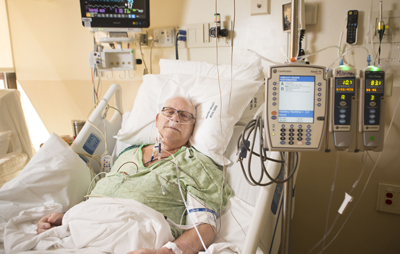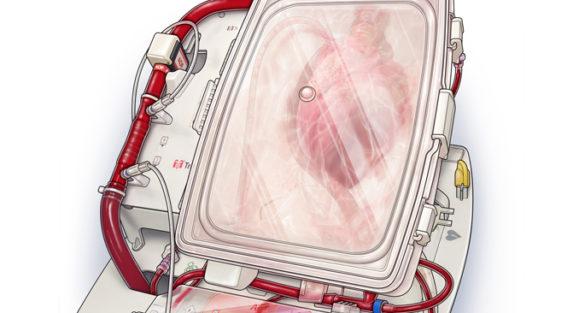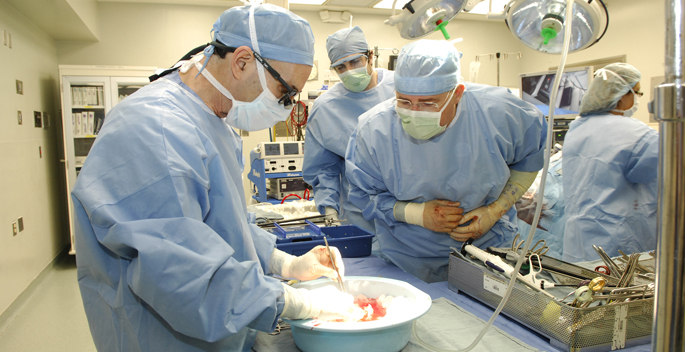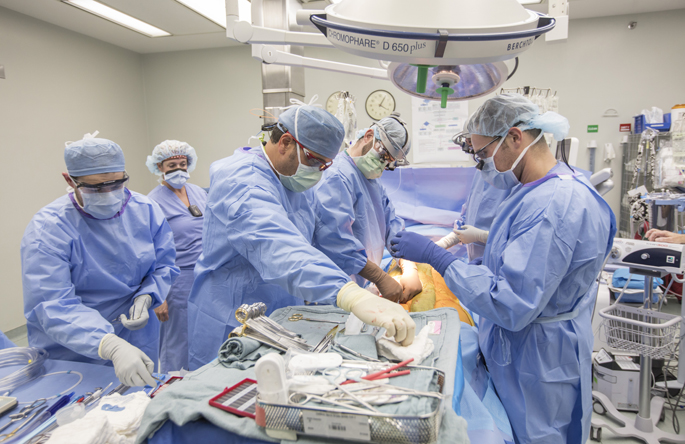The heart transplant team at Vanderbilt University Medical Center successfully transplanted two hearts using a novel preservation and transport technology allowing the heart to beat outside of the body for an extended amount of time.
VUMC is one of nine centers across the United States, and the only one in the region, to participate in the EXPAND Heart Pivotal Trial using a device by TransMedics called the Organ Care System (OCS) to keep the heart beating and metabolically alive during transport from the donor to the recipient. The machine is designed to keep the heart beating outside of the donor’s body (ex-vivo).
Traditionally, surgeons work to transplant a heart within four hours after it has been harvested from the donor’s body. OCS can extend that time frame, potentially changing the way donor hearts are preserved and transported to recipients.
“Every once in a while you come across technology that makes you get a glimpse into the future,” said Ashish Shah, MD, chair of the Department of Cardiac Surgery at Vanderbilt. “Whole organ perfusion is the future. As a transplant team, we are able to deliver on a complex undertaking that requires a high level of expertise that few programs have.
“We see incredible possibilities with this platform,” said Shah. “We are providing a unique opportunity to help patients while also getting a new understanding of human heart physiology.”
Since launching the organ perfusion program, Vanderbilt has used the technology for three hearts. Two were transplanted, while a third organ did not meet the quality standards for surgery.
Shah deemed all three perfusions as successful.
“We have to think differently about this technology,” said Shah. “All three of these organs would have been declined upon first appearance. But with this platform, the element of time is removed.
“We were able to adequately and thoroughly evaluate the hearts. We felt reassured that two of the hearts would work very well, while one was not appropriate. That is the value of this innovation. We had the time to test the organ and make decisions that were best for our patients.”

Jerry Parker, 69, became one of the first Vanderbilt patients transplanted using the new system on March 2.
“I know I am alive today because of this system,” said Parker, days after receiving a new heart. “I don’t really know how to explain how I am feeling right now because everything is so new. I didn’t have a whole lot of time to read up on this.
“I can tell you that my team says everything is going really well and my heart is in great shape.”
Parker and his wife, Cathy, drove to Nashville from Hixon, Tennessee, 20 miles outside of Chattanooga, on March 1.
“After we got the call, we were both scared,” said Cathy, looking over at her husband of 48 years. “I asked him if he wanted me to drive and he said, ‘No, I’m nervous enough already.’”
The pair said doctors told them about OCS during a visit in February when Parker was placed on a continuous intravenous (IV) medication to help his heart function while waiting for transplant.
In 2000, he suffered a major heart attack, followed by a quintuple bypass in 2001.
He was told five years ago that a transplant would be necessary to prolong his life. He has been on the transplant list for three years.
“During a visit three weeks ago, we agreed to participate if a heart became available,” said Parker. “I’m really looking forward to just being able to get around and not having trouble breathing. I just haven’t been able to do very much these past few years.”
Parker’s son, Eric, said his father turned 69 on March 4 and said his new heart is one of the best presents his dad ever received.
“It’s definitely an incredible gift,” said Eric. “I hope it allows him to have a better quality of life and do more with his granddaughters.
“His team keeps saying how happy they are with how things are going. My dad was able to have a heart that probably would not have been available to him because of distance or time. We are just so thankful.”
Both patients are recovering and making great progress, according to Shah.















